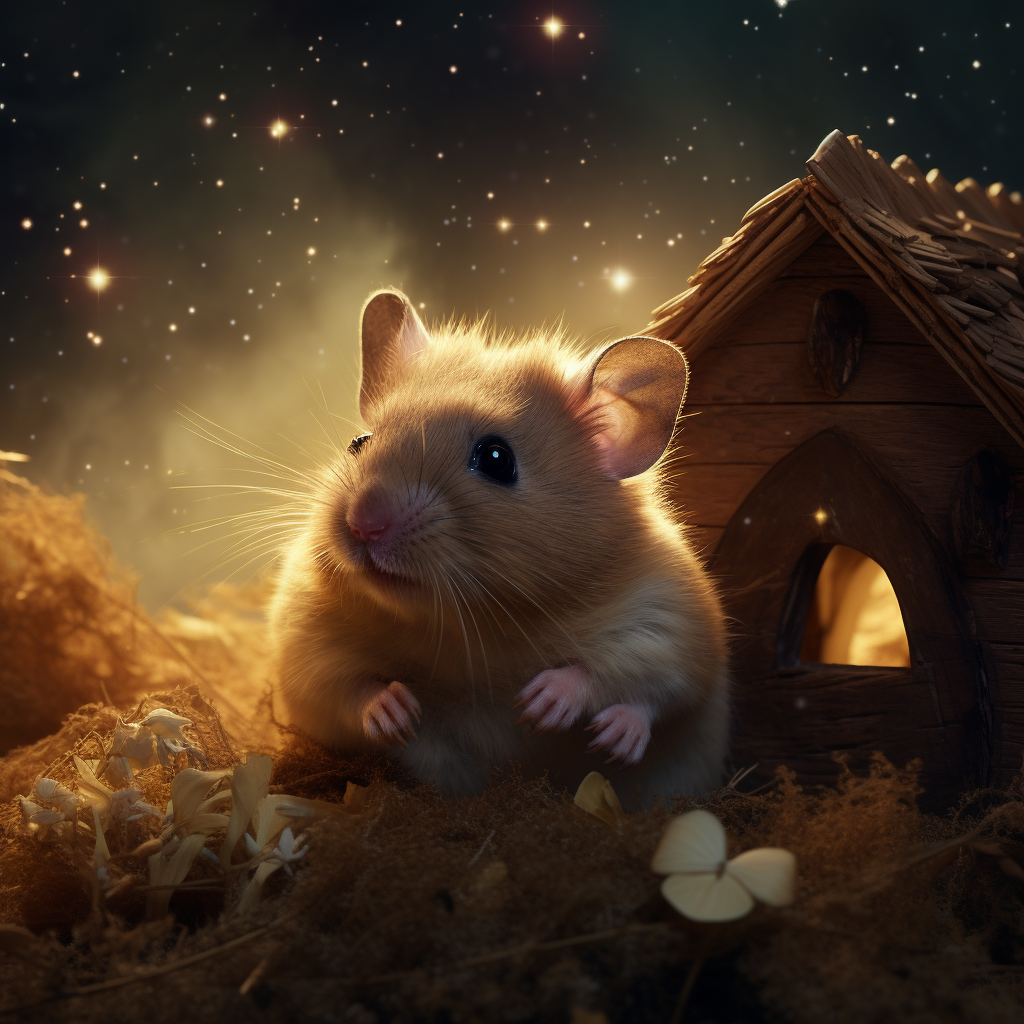Introduction
If you’ve recently welcomed a hamster into your home, you might have noticed that these adorable creatures are most active when the sun goes down. Hamsters are naturally nocturnal, meaning they sleep during the day and are active at night. This can be a bit of a challenge for ‘daytime humans,’ but with a few adjustments, you can coexist peacefully and even enjoy your hamster’s nightly escapades. Let’s explore how you can adapt to your hamster’s nocturnal lifestyle.
Table of Contents
Understanding Your Hamster’s Nocturnal Lifestyle
Why Are Hamsters Nocturnal?
In the wild, hamsters’ nocturnal behavior helps them avoid daytime predators and extreme temperatures. This behavior is hardwired into their genetics, so even domestic hamsters exhibit these nocturnal tendencies.
The Hamster’s Nighttime Routine
At night, hamsters are incredibly active. They use this time to exercise, explore, forage for food, and play. It’s not just a preference but a necessity for their physical and mental well-being.
Managing Noise and Disturbance
Managing the noise and disturbance caused by a nocturnal pet like a hamster is crucial for maintaining a peaceful household, especially during the night. One effective strategy is to invest in silent wheels. Traditional hamster wheels can be quite noisy, but modern designs offer quieter alternatives that allow hamsters to exercise without creating a racket. Additionally, selecting soft-textured or noise-minimizing toys and accessories for the cage can significantly reduce the sounds of nighttime play.
Ensuring the cage’s location is strategically placed in a less-trafficked area of the home, such as a spare room or a corner away from bedrooms, can also help in muffling any incidental noise. Implementing these strategies not only contributes to a more tranquil environment for the household but also supports the natural nocturnal activities of your furry friend without causing disruption or stress.
Tips for Adapting to Their Schedule
Creating a Suitable Environment
- Location of the Cage: Keep the hamster’s cage in a room where nighttime activities won’t disturb your sleep. A spare room or a living area could be ideal.
- Minimizing Noise: Opt for a quiet wheel and toys that don’t make too much noise. This will allow your hamster to play without creating a racket.
Adjusting Your Routine
- Evening Interaction: Spend time with your hamster during the evening when they’re starting to be active. This can be a good time for gentle handling or play.
- Feeding Schedule: Adjust their feeding schedule to align with their active hours. Evening and early morning are good times to provide fresh food and water.
Respecting Their Sleep
Just as you need your sleep at night, your hamster needs uninterrupted sleep during the day. Avoid waking them unnecessarily, and provide a cozy, darkened area in their cage for sleeping.

Health and Wellness in Nocturnal Pets
Regular Exercise
Ensure your hamster has plenty of opportunities for physical activity. Exercise wheels, tunnels, and climbing structures can help them stay fit and entertained during the night.
Safety Measures for Hamsters at Night
Ensuring the safety of your hamster during their active nighttime hours is paramount. The first step is to secure the hamster’s cage properly. This involves checking that the cage doors are firmly closed and that there are no gaps through which the hamster could escape. It’s also vital to hamster-proof the room where the cage is located. Remove any small objects that could be ingested, ensure electrical cords are out of reach or protected, and eliminate any potential hazards like open water sources. Additionally, it’s beneficial to create a safe play area where the hamster can roam freely under supervision, using hamster playpens or designated, enclosed spaces.
Regular inspection of the cage for any wear or damage that could harm the hamster, like sharp edges or broken bars, is also important. By taking these safety measures, you can create a secure and hazard-free environment that allows your nocturnal pet to explore and exercise safely during the night.
Monitoring Health
Regularly monitor your hamster’s health. Being active at night might make it a bit more challenging to spot early signs of illness. Pay attention to their eating habits, energy levels, and general behavior.
Feeding Routines for Noctural Hamsters
Feeding routines for nocturnal pets such as hamsters require special consideration to align with their unique lifestyle. Since hamsters are most active during the night, it’s best to schedule feeding times in the late evening or early morning. This timing ensures that food is available when they are naturally inclined to eat. In terms of diet, a balanced mix of hamster pellets, fresh fruits and vegetables, and occasional treats like nuts or seeds is ideal.
Portion control is crucial; overfeeding can lead to health issues like obesity. Typically, a small, measured amount of pellets once a day, supplemented with a tiny portion of fresh produce every other day, is sufficient. It’s also important to regularly clean and refill their water bottle to ensure they have access to fresh water at all times. By adhering to these best practices, you can maintain your hamster’s health and happiness, keeping in sync with their nocturnal habits.
Frequently Asked Questions
Can I change my hamster’s nocturnal habits?
It’s not advisable to try and change your hamster’s natural nocturnal behavior. Doing so can cause stress and health issues.
Will my hamster ever be active during the day?
Hamsters may have short periods of activity during the day, but their primary active times will always be at night.
How can I bond with my hamster if I’m asleep when they’re awake?
You can bond with your hamster during the early evening or morning when their active times might overlap with your waking hours.
Additional Resources
For those interested in exploring more about adapting to a hamster’s nocturnal lifestyle and ensuring their health and happiness, consider these resources:
- “Creating a Hamster-Friendly Home” offers practical tips for setting up your home to accommodate a nocturnal pet.
- “The Nocturnal Habits of Hamsters” delves into the scientific reasons behind hamsters’ night-time activities and how to support them.
- “Is It Normal for my Hamster to Sleep at Night” talks about the nocturnal habits of hamsters.
Conclusion
Adapting to your hamster’s nocturnal lifestyle can be a fun and rewarding experience. By understanding their needs, adjusting your environment, and respecting their natural habits, you can enjoy a harmonious relationship with your furry night owl. Remember, the key is adaptation and respect for their innate behaviors, ensuring a happy and healthy life for your nocturnal companion.

